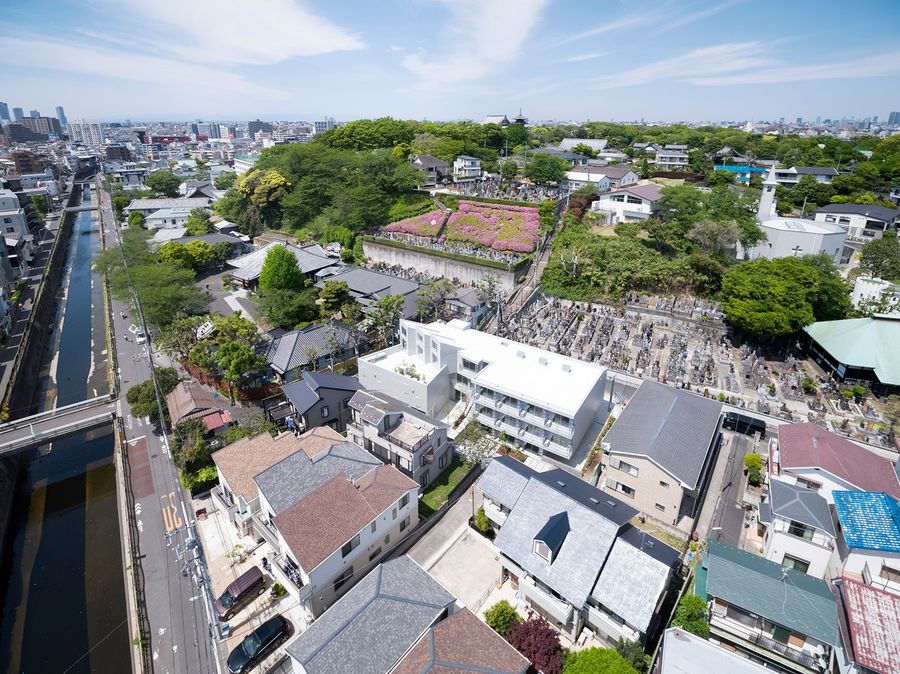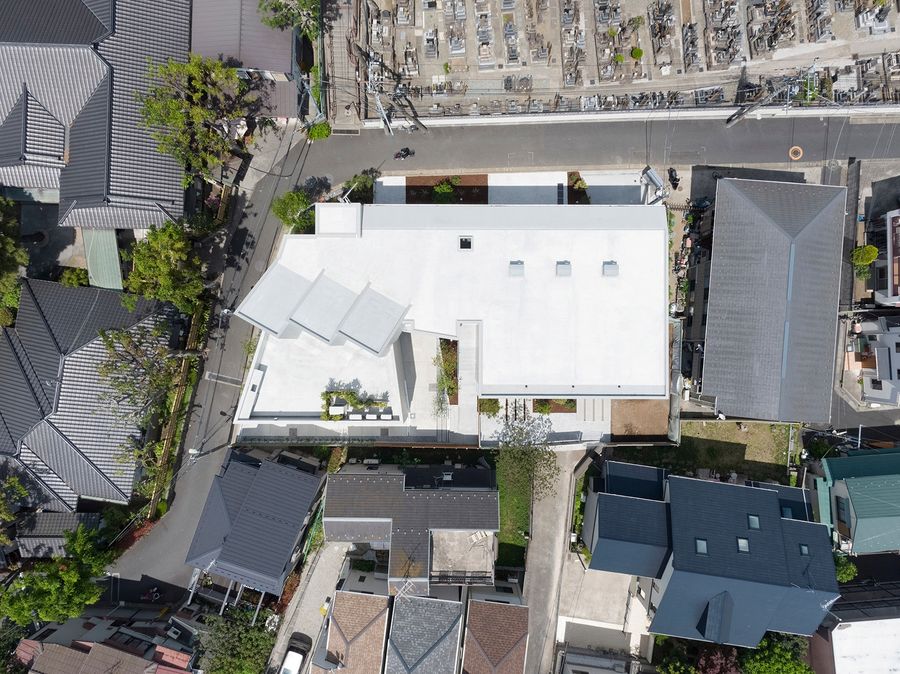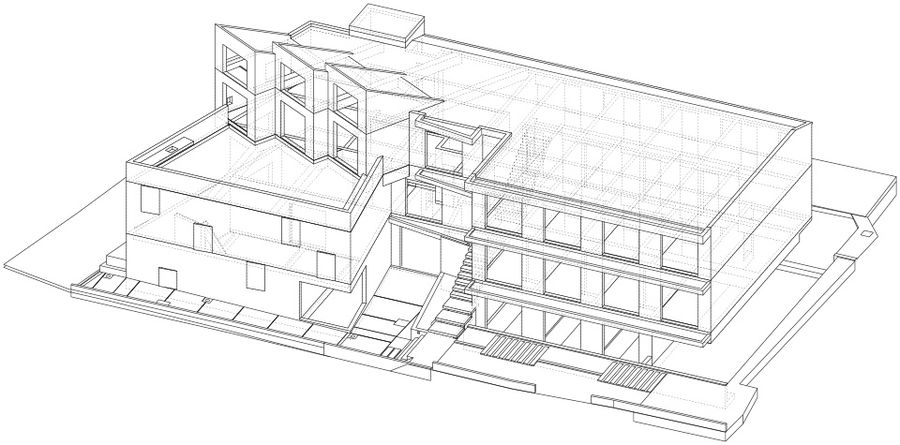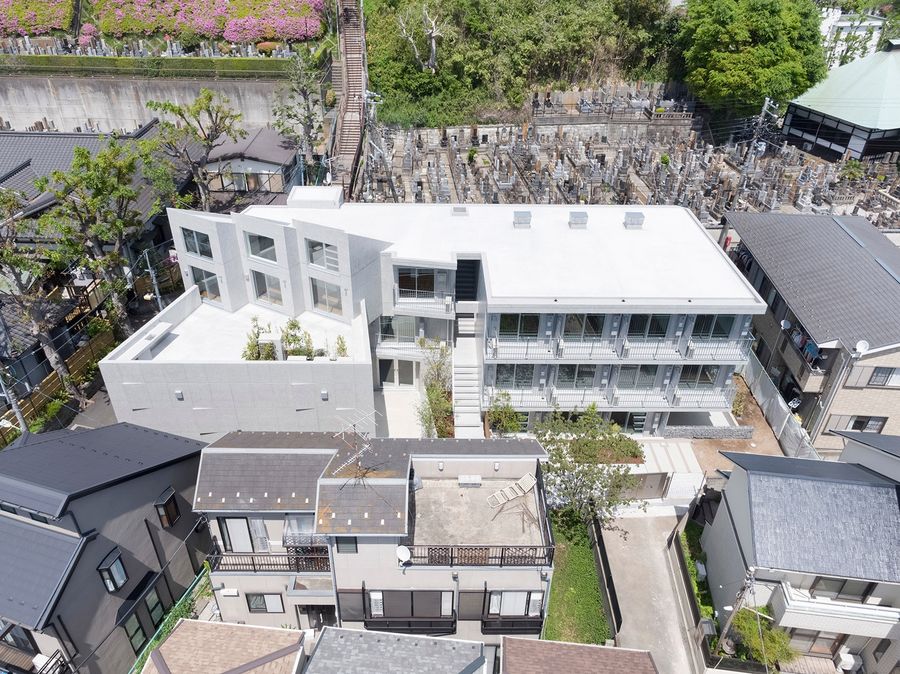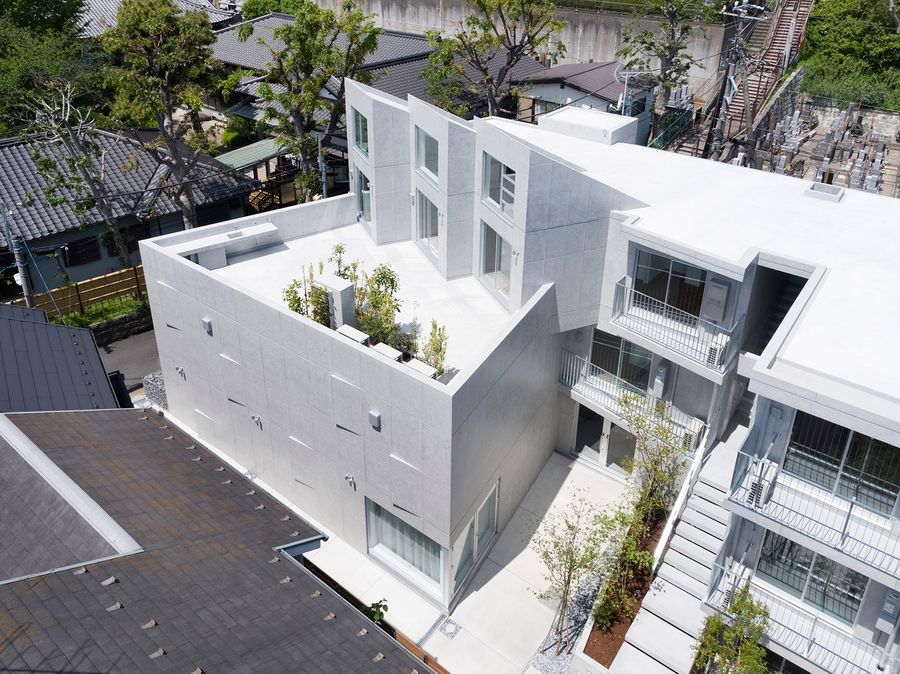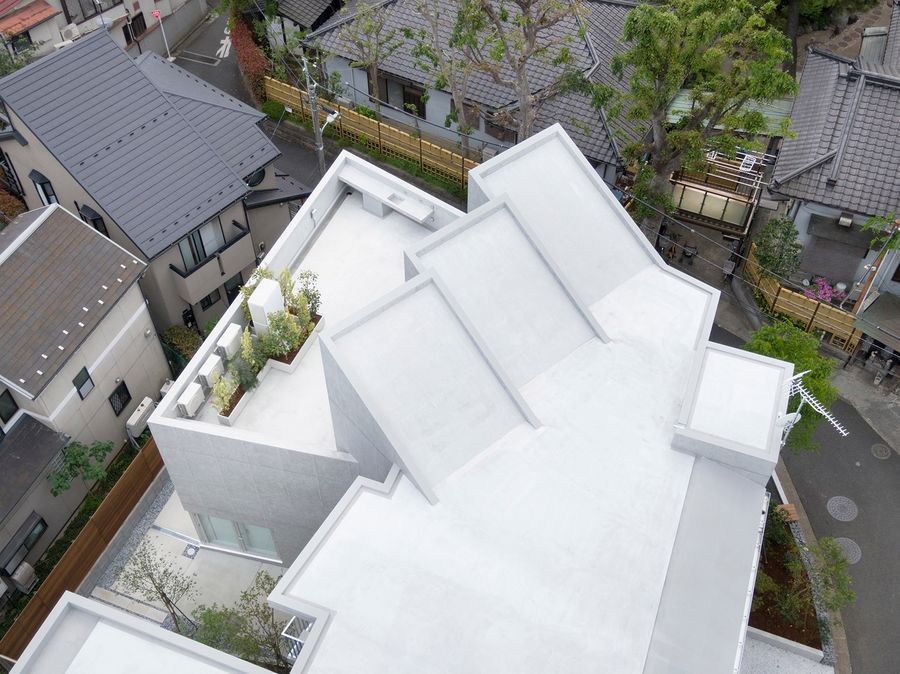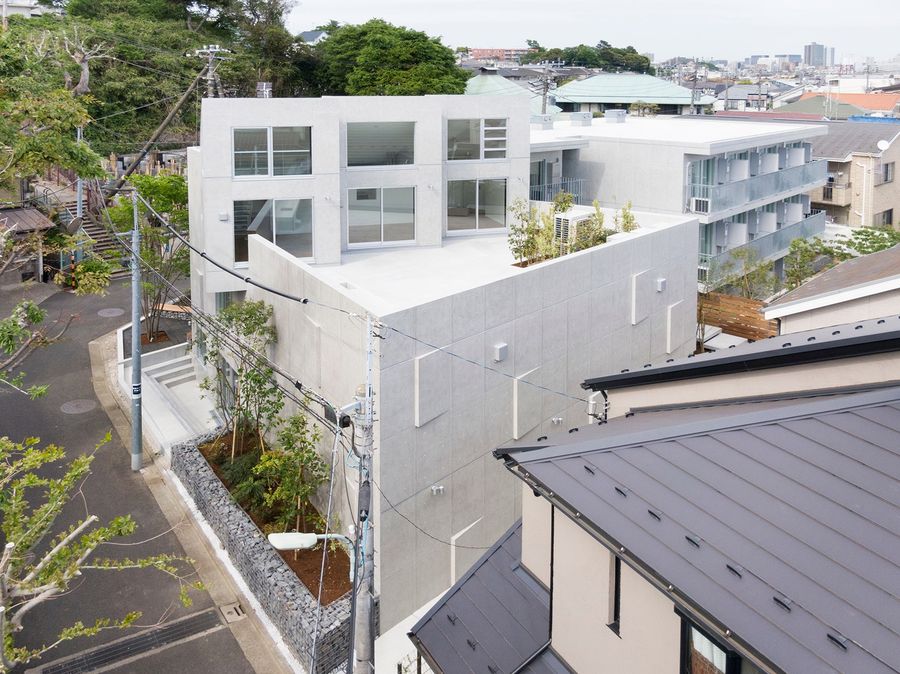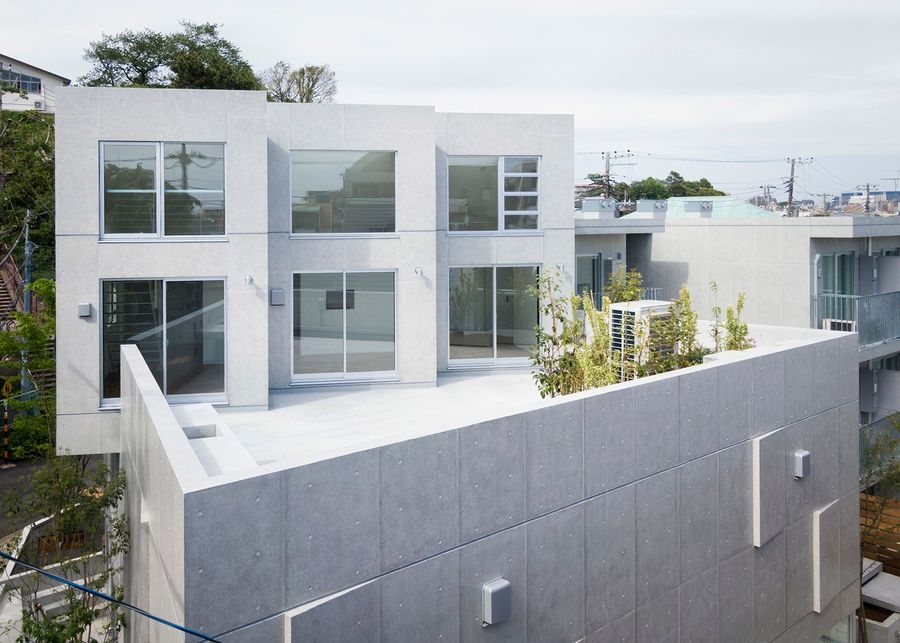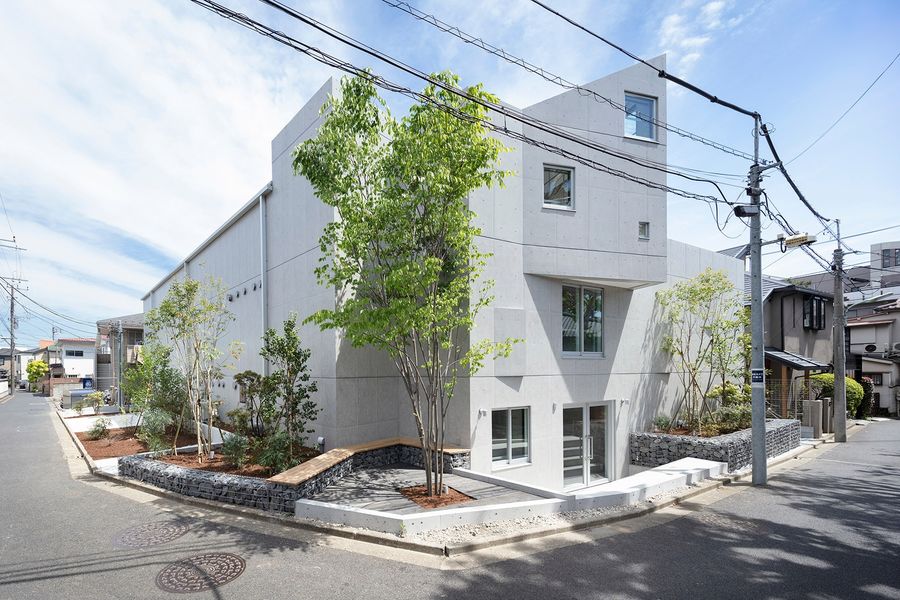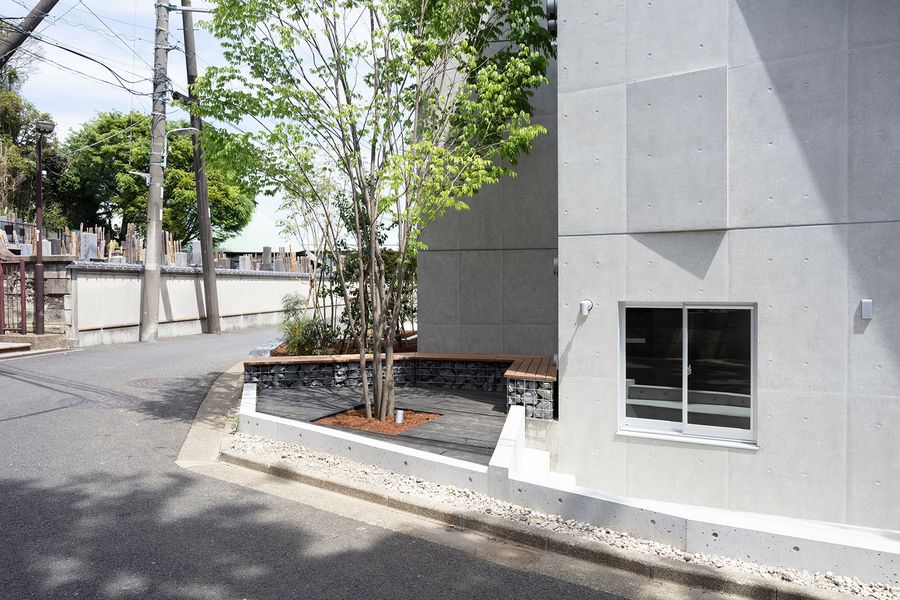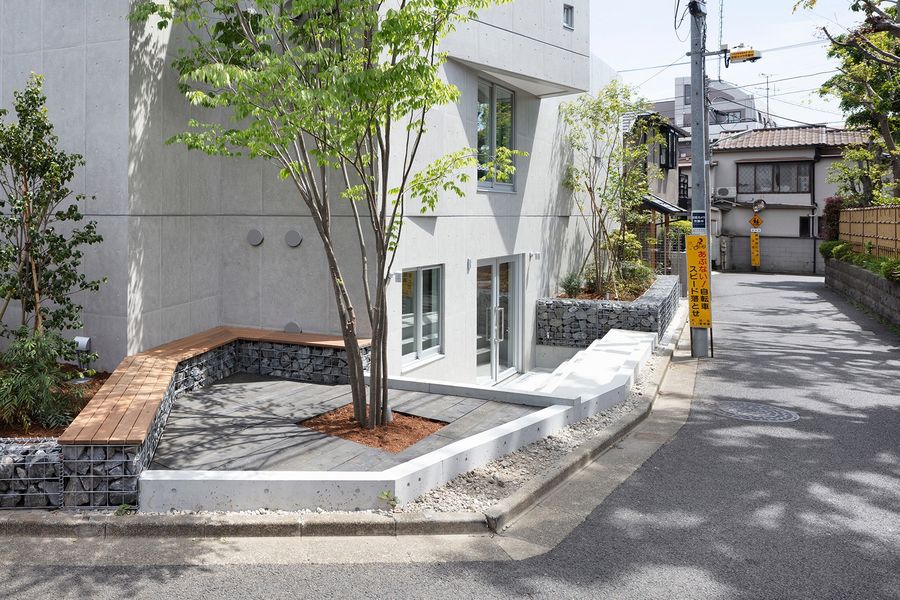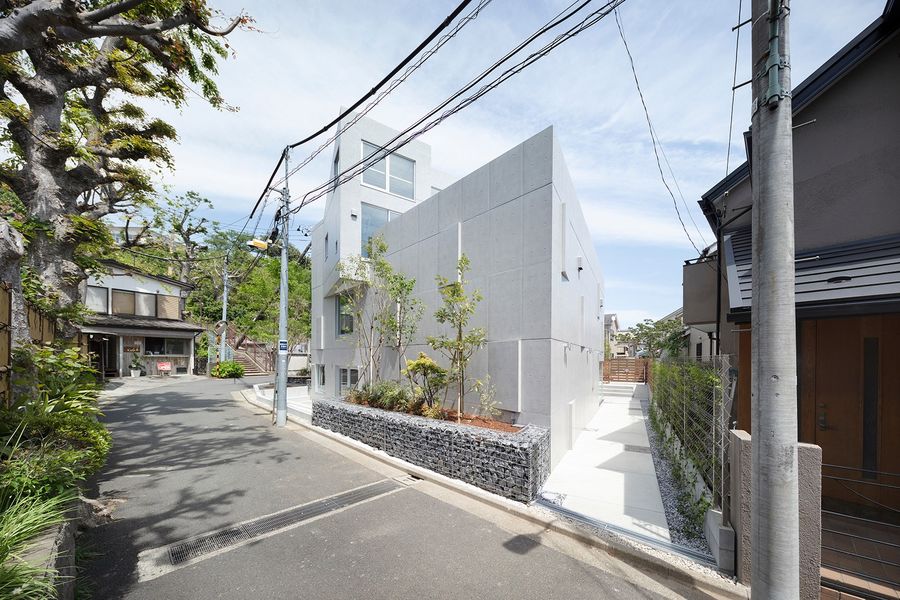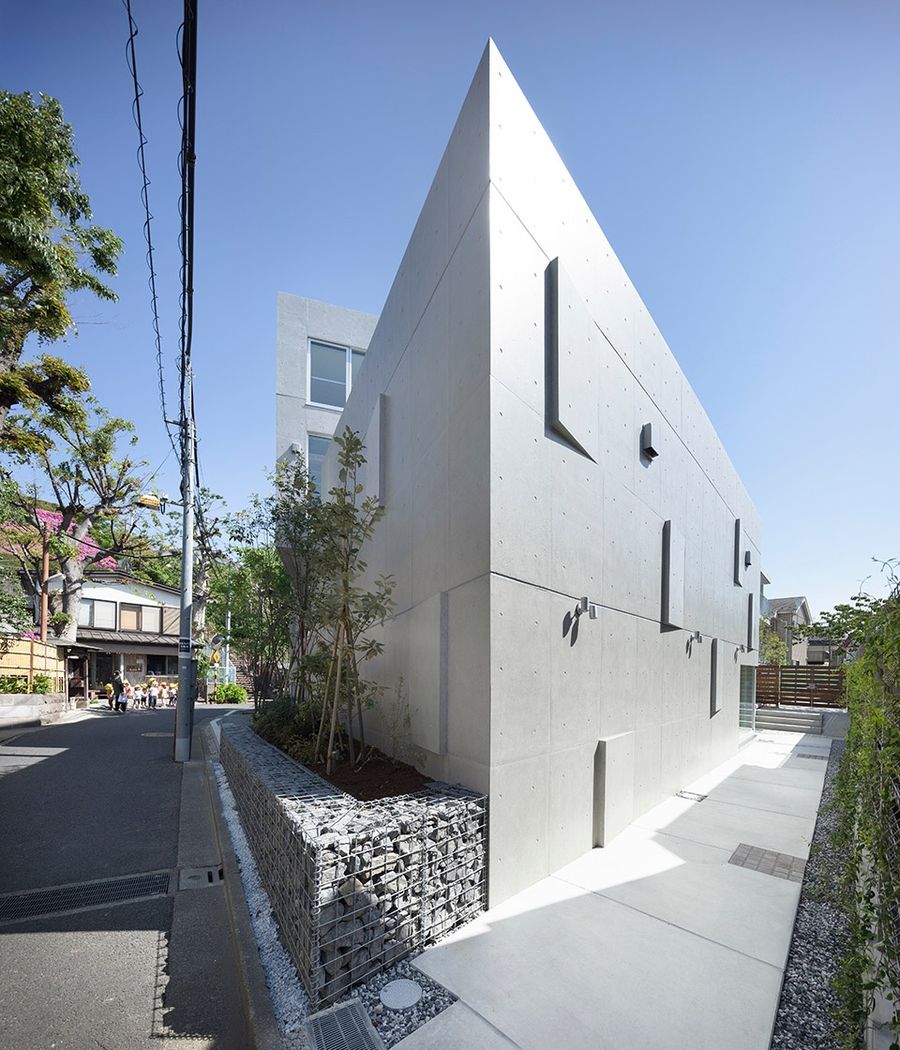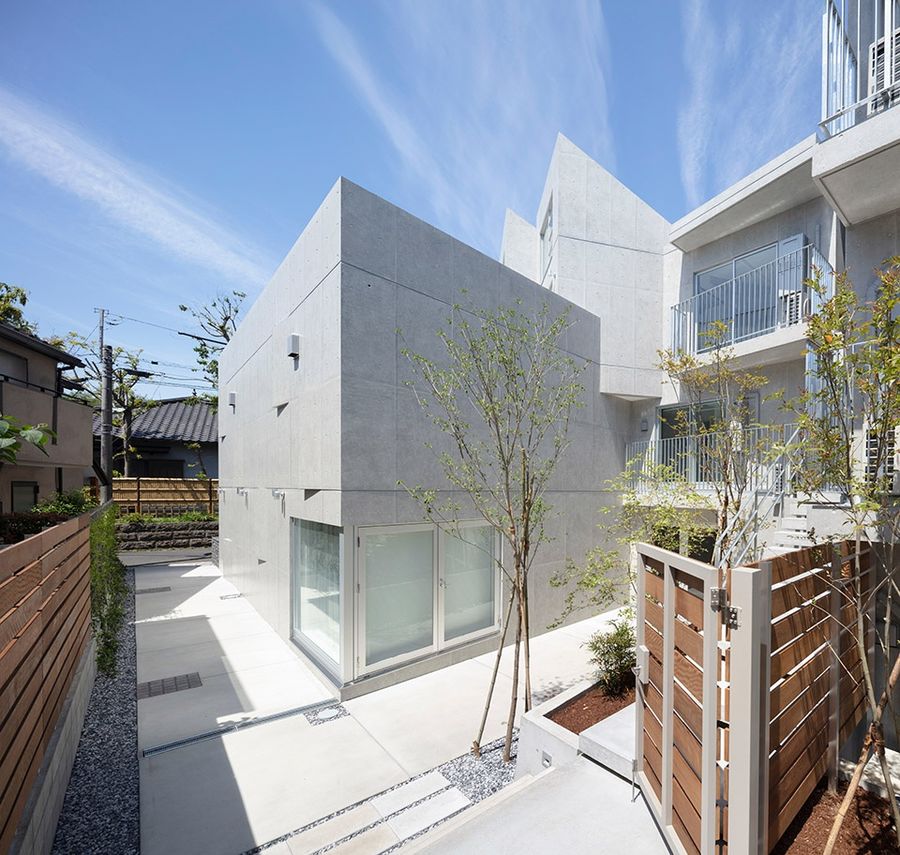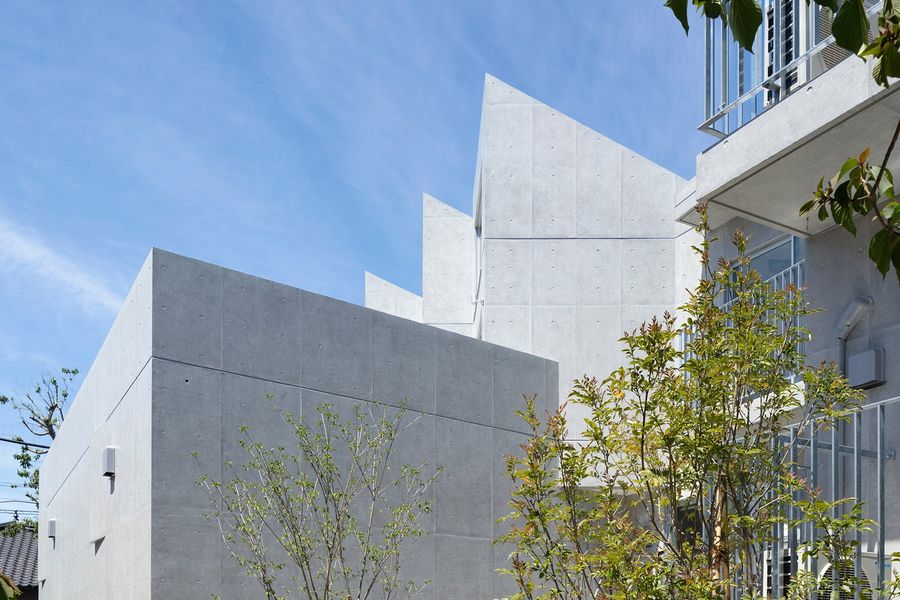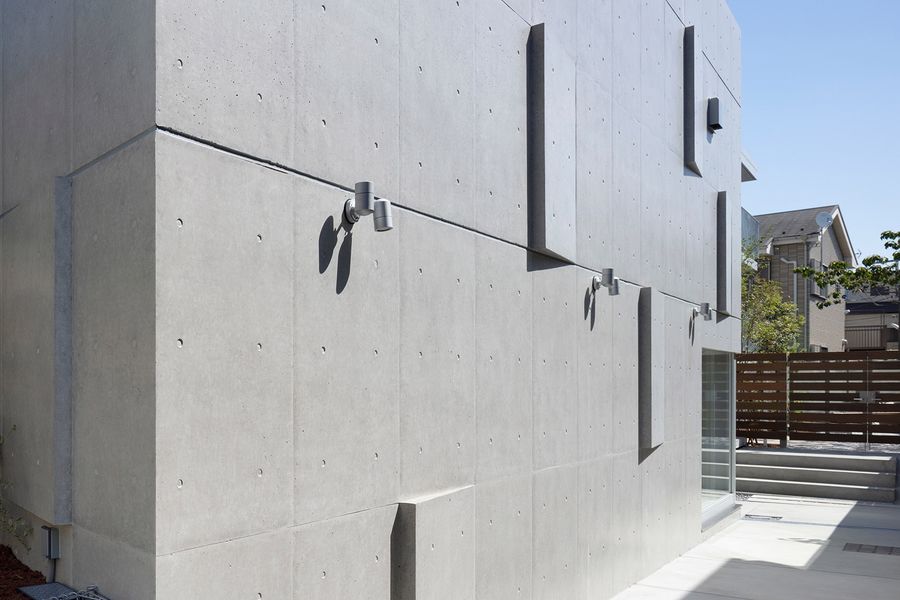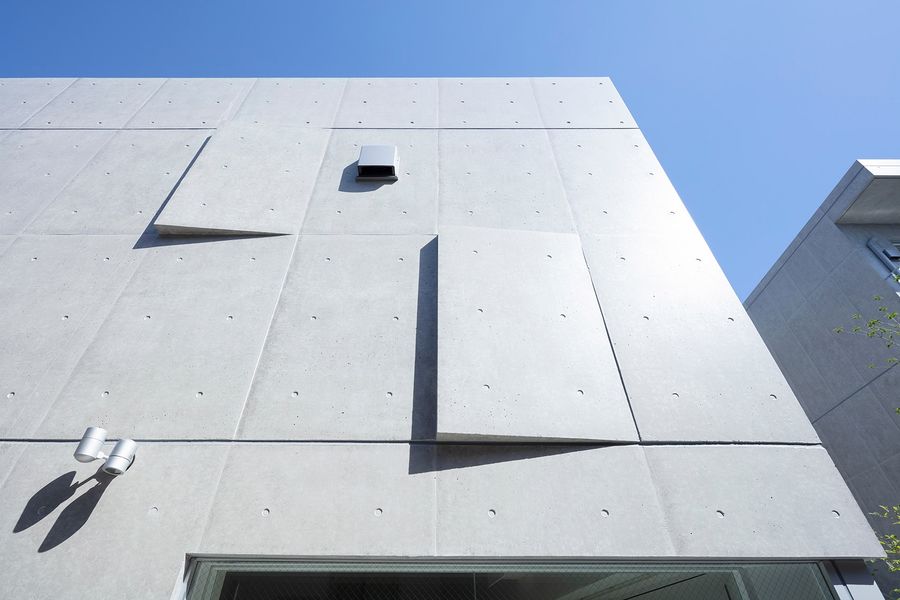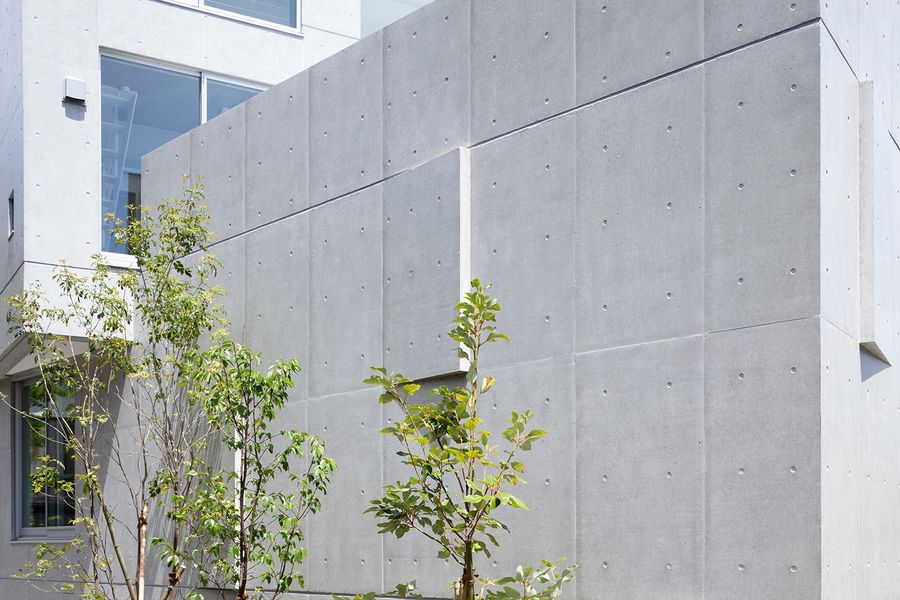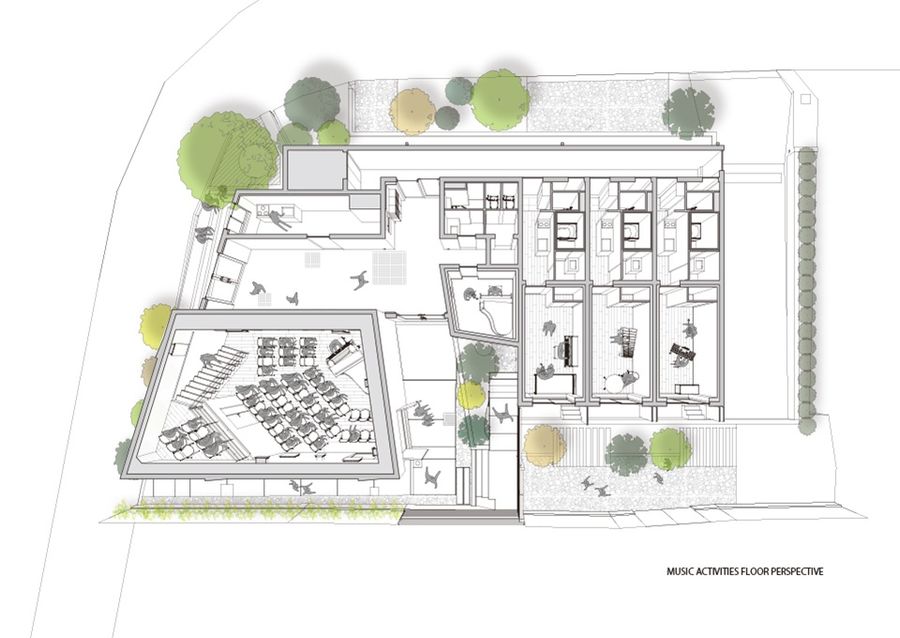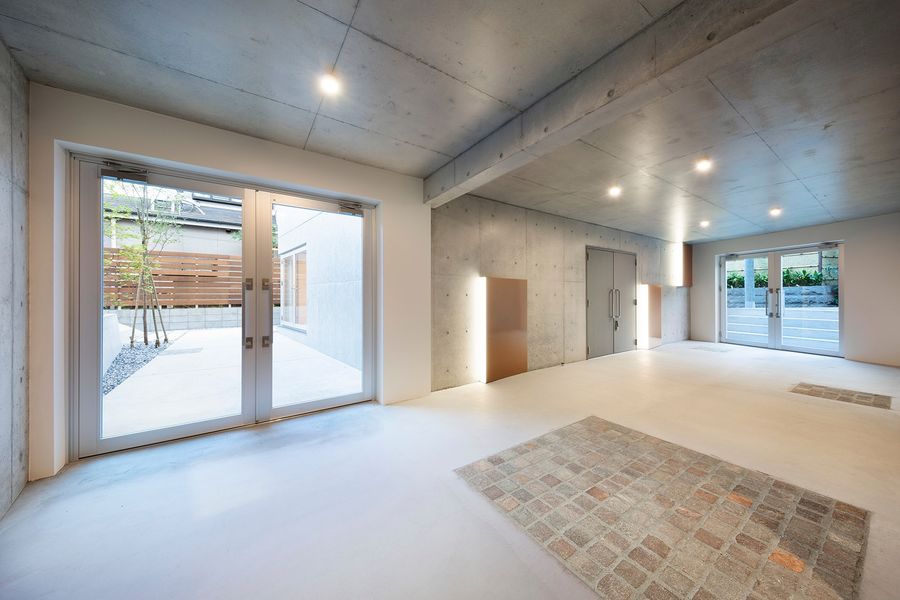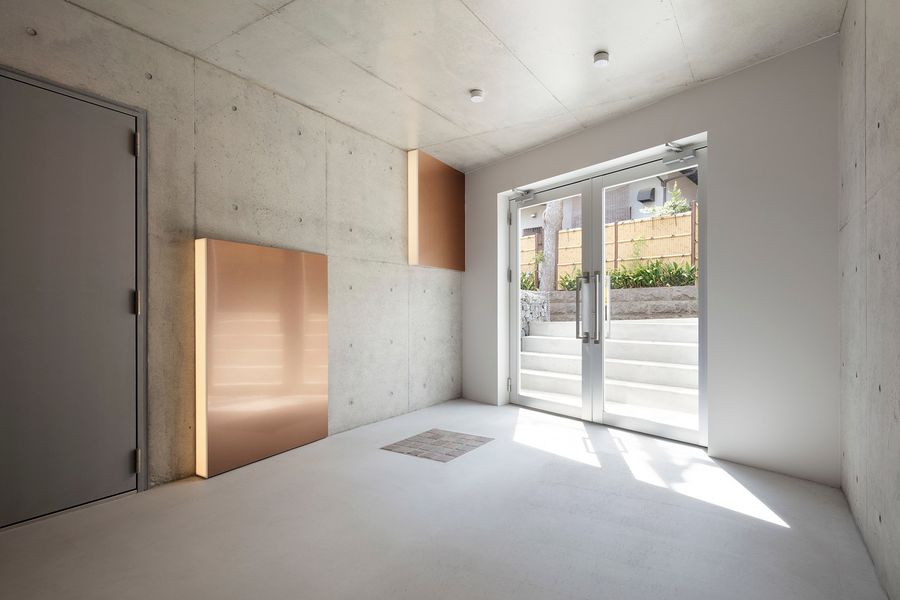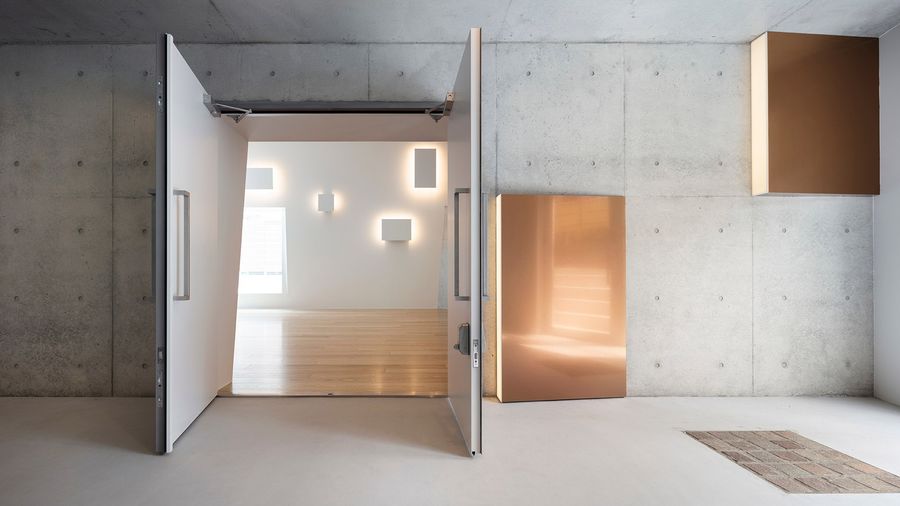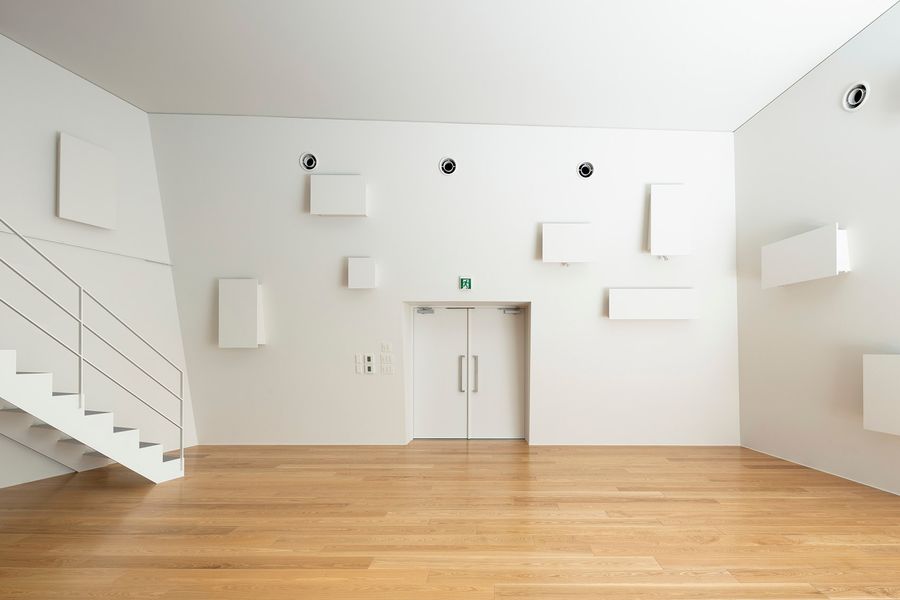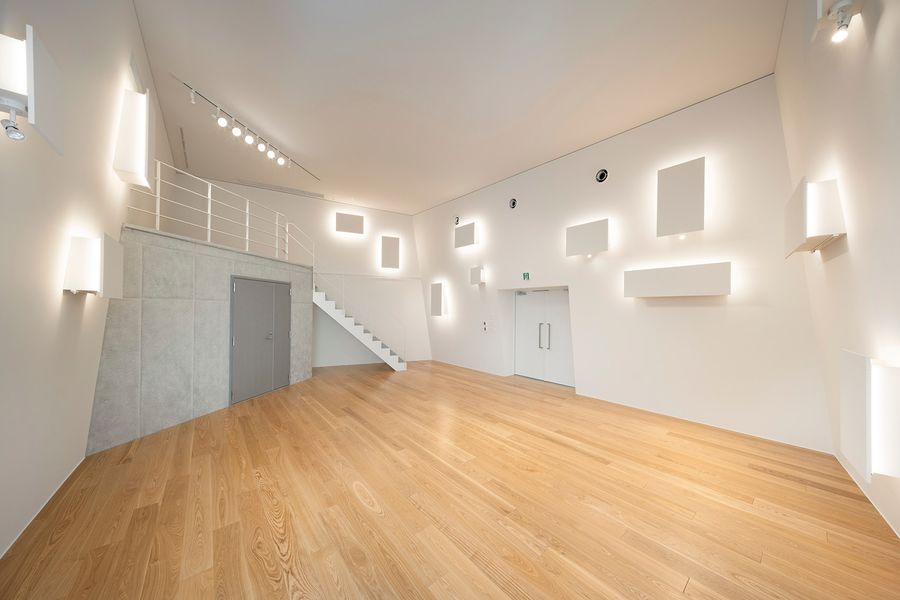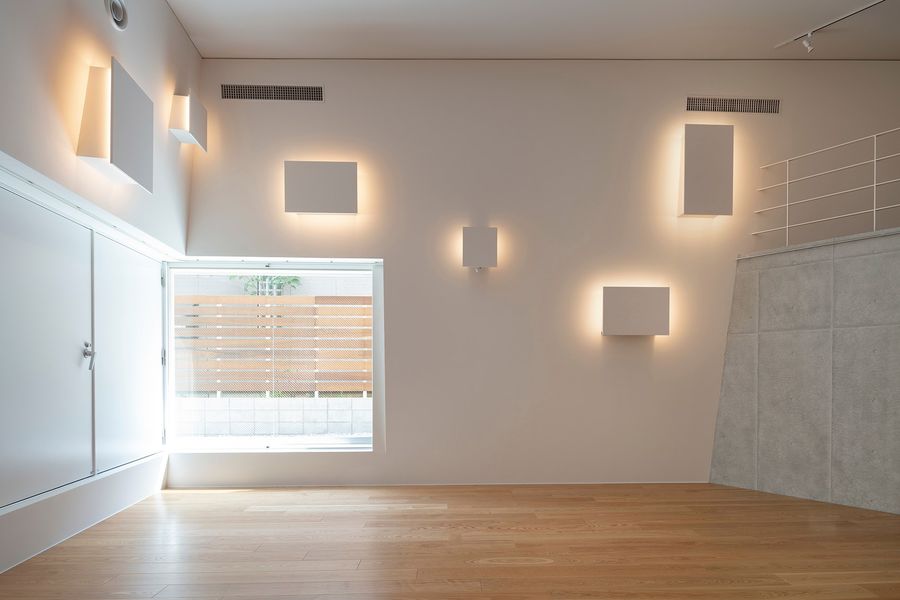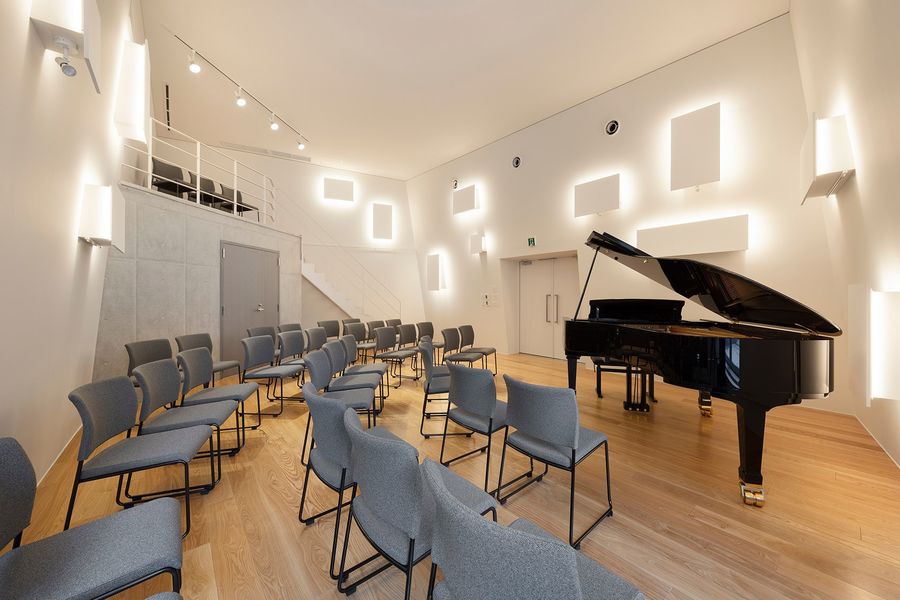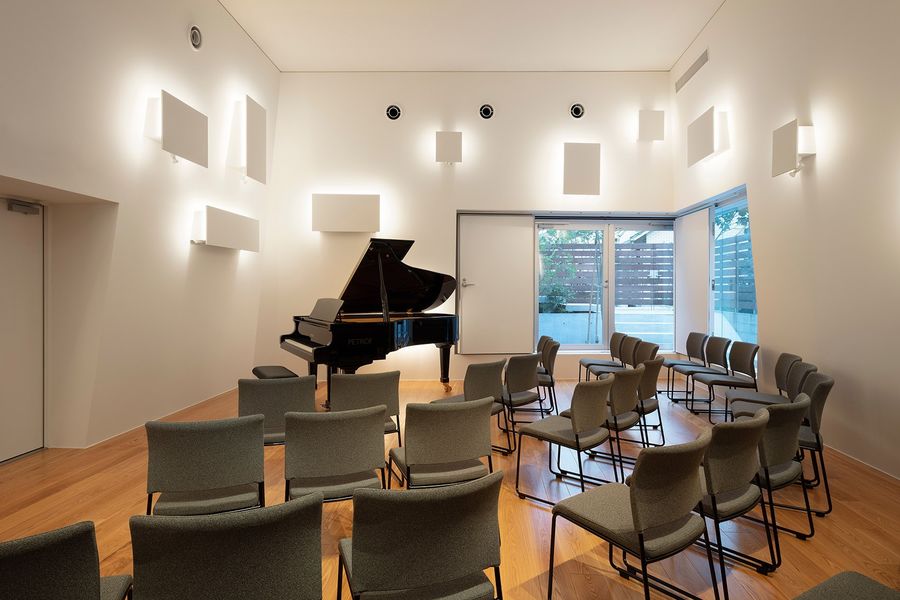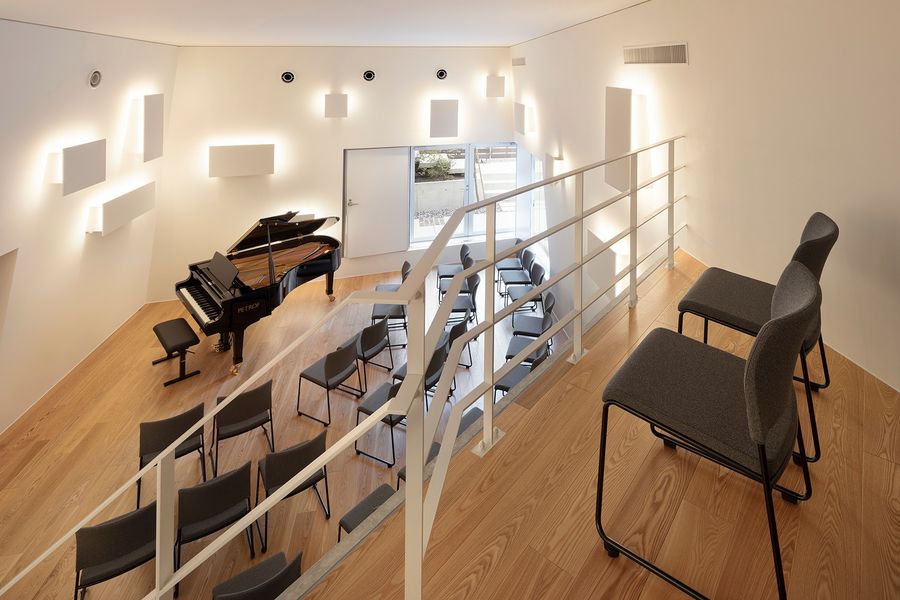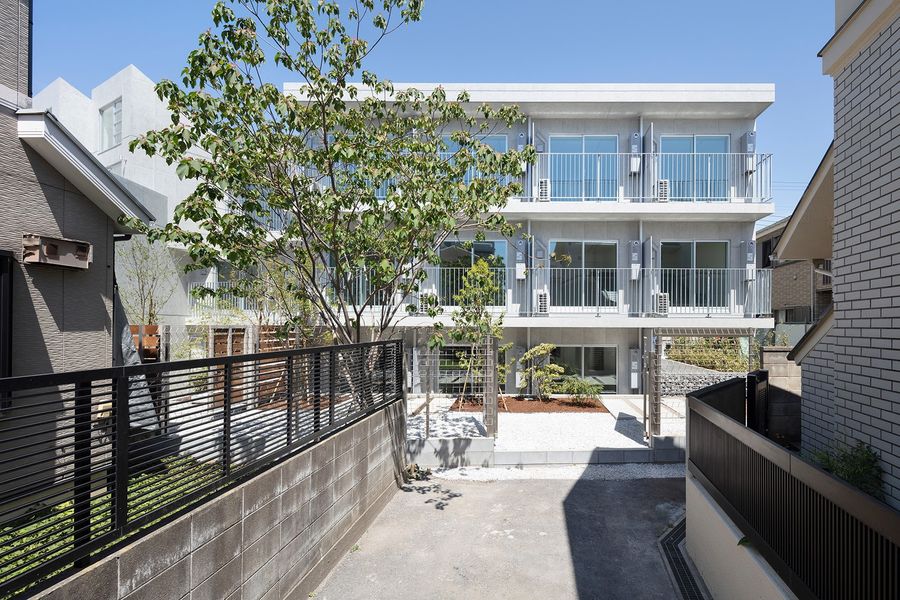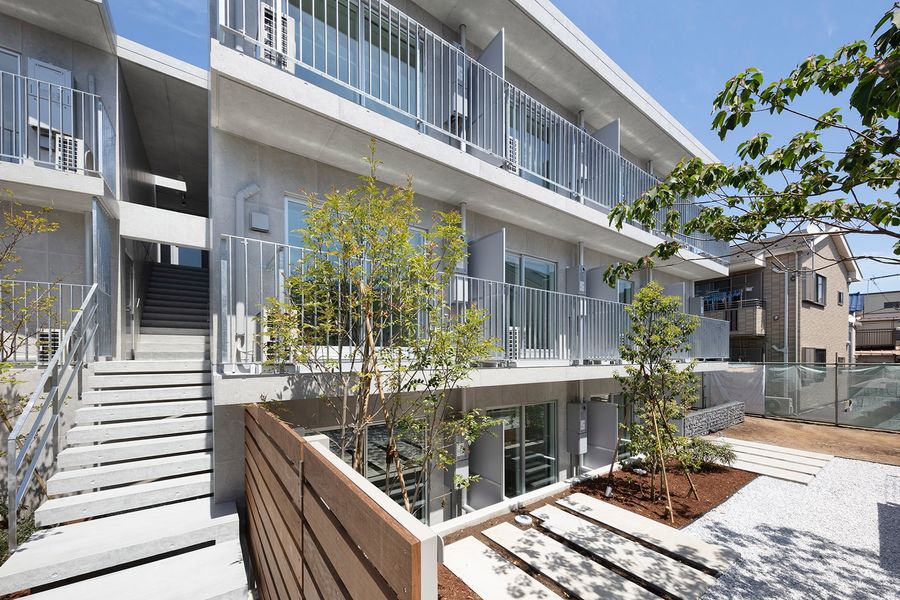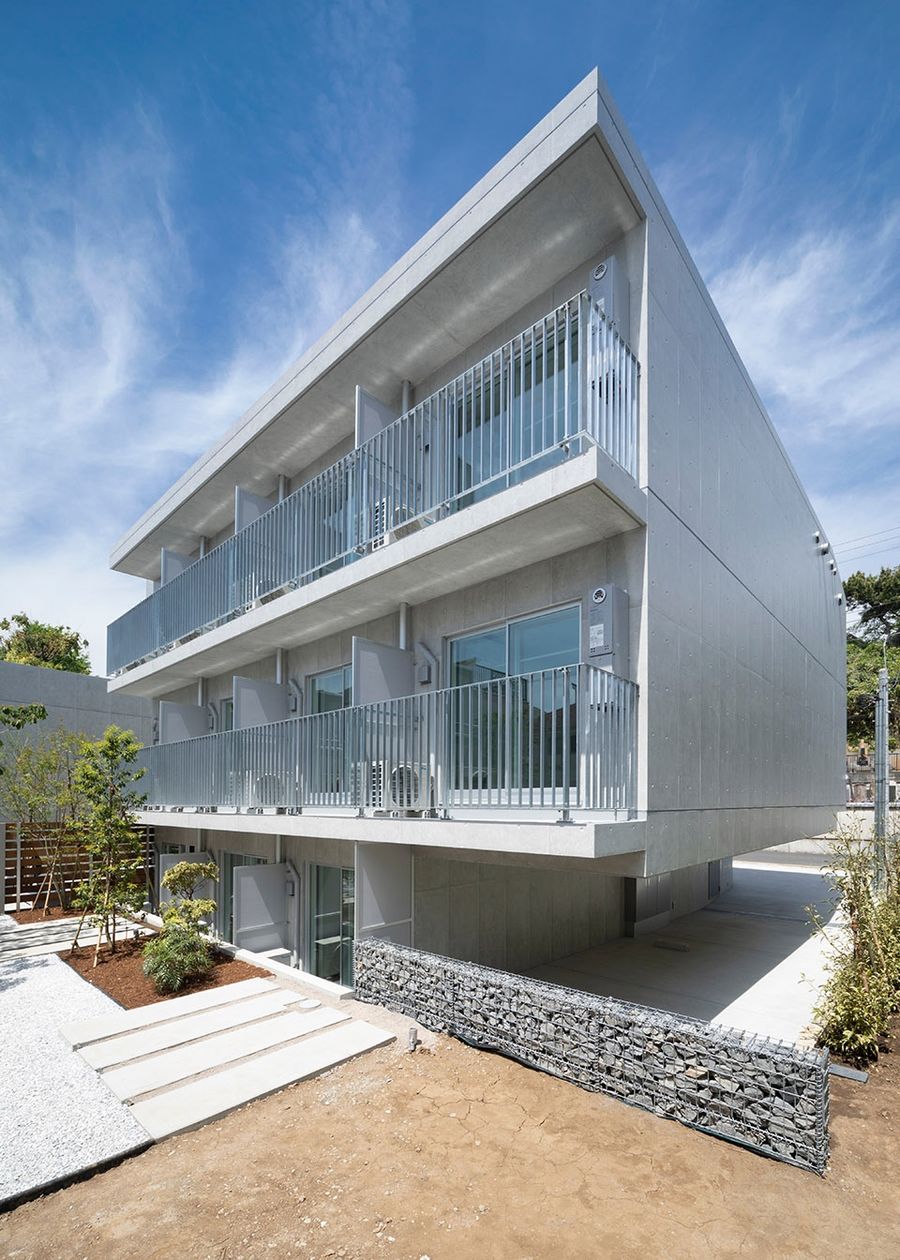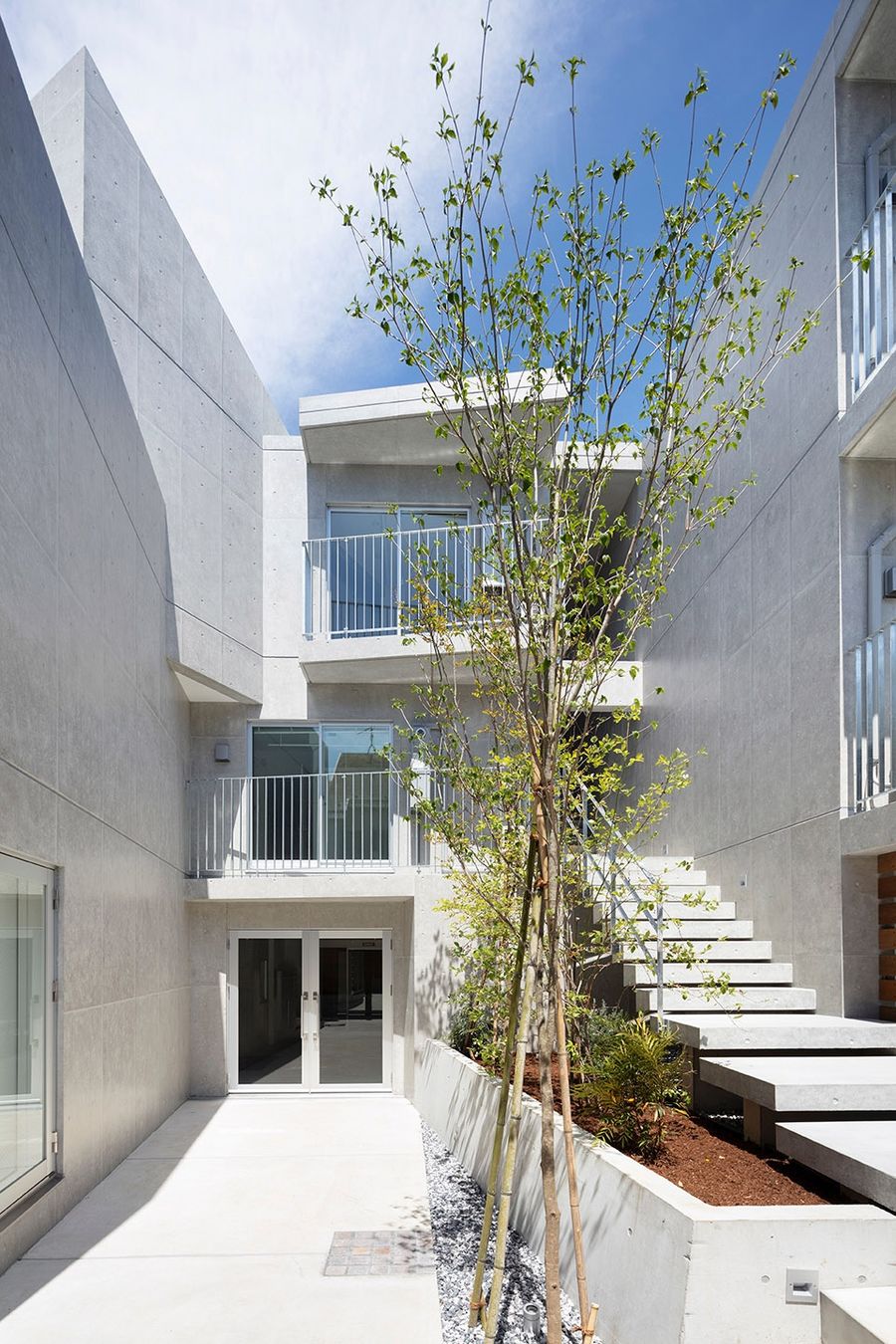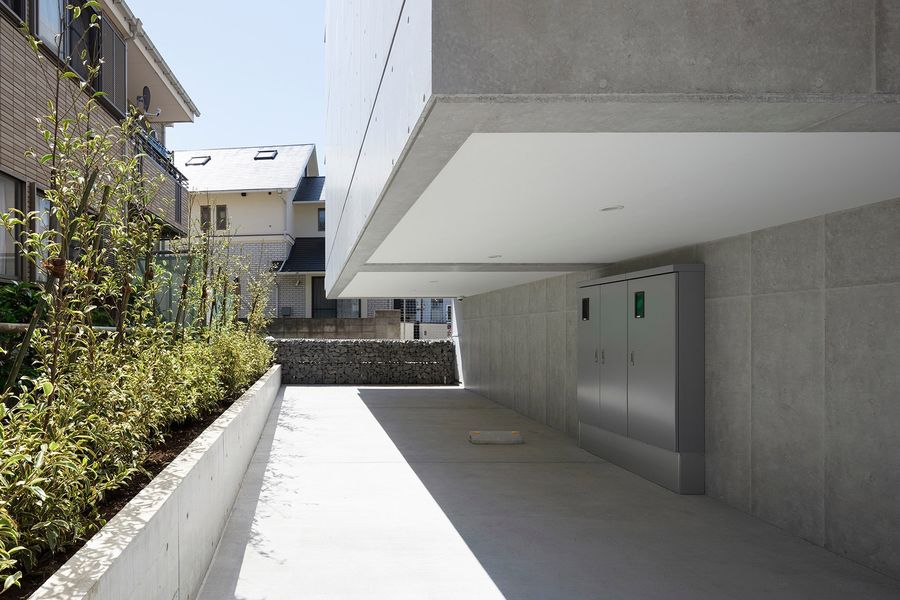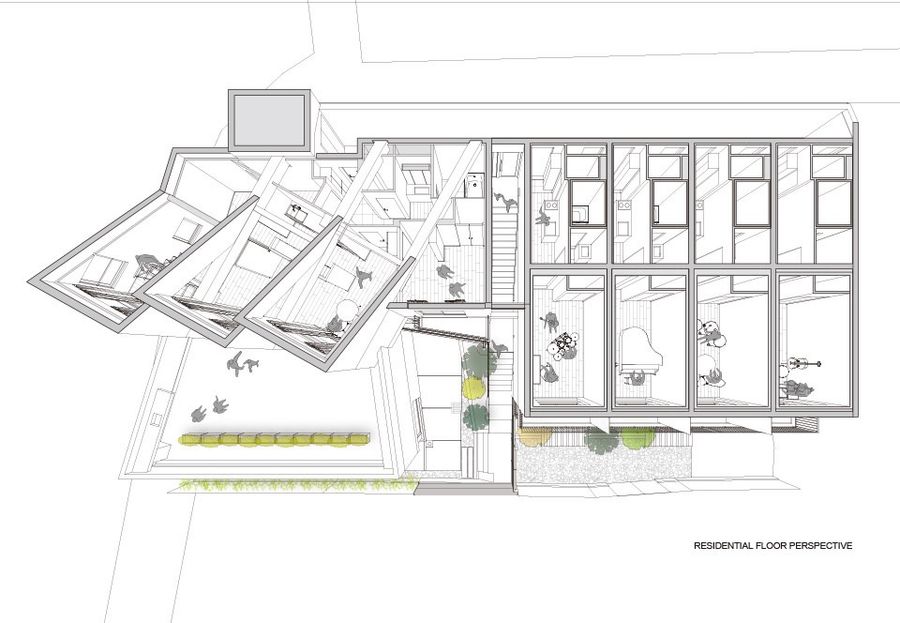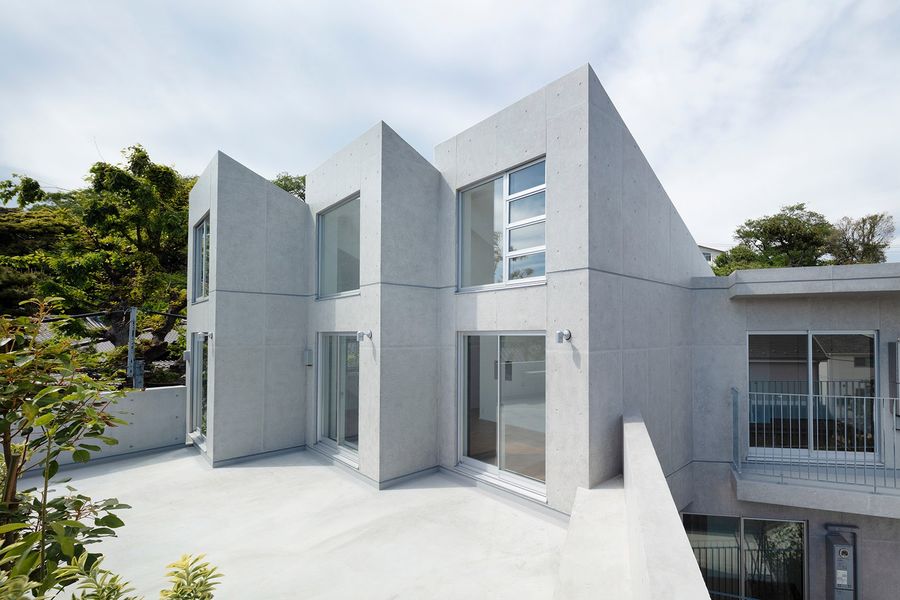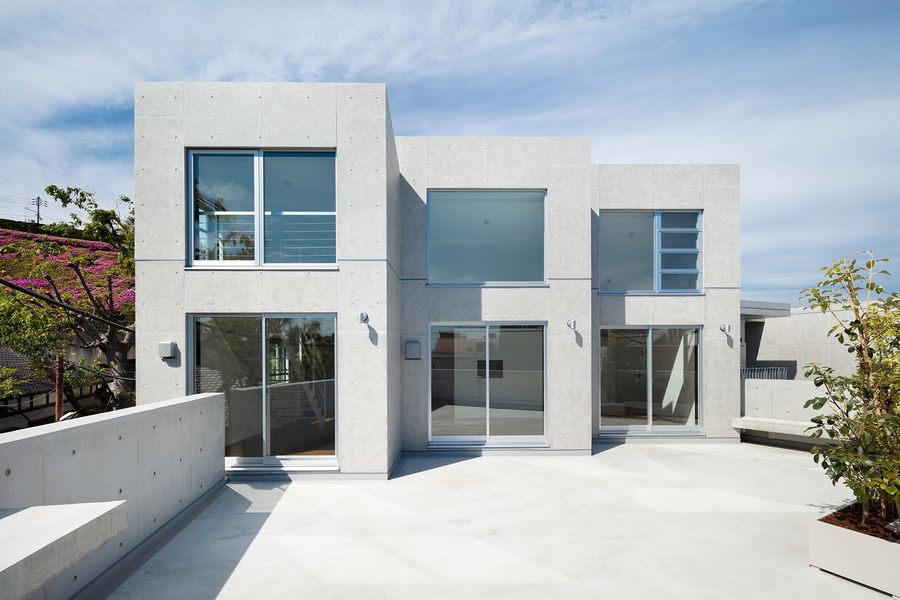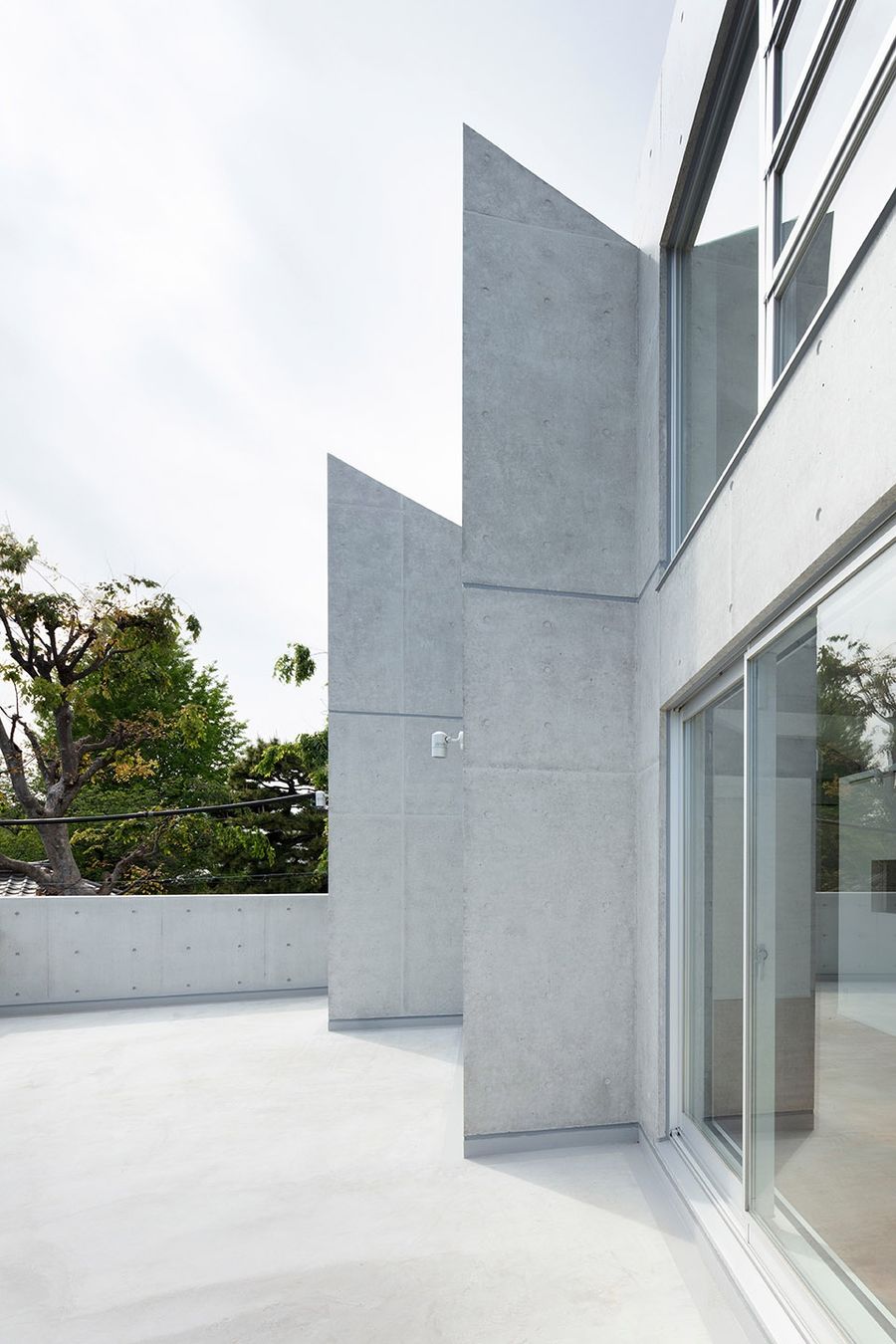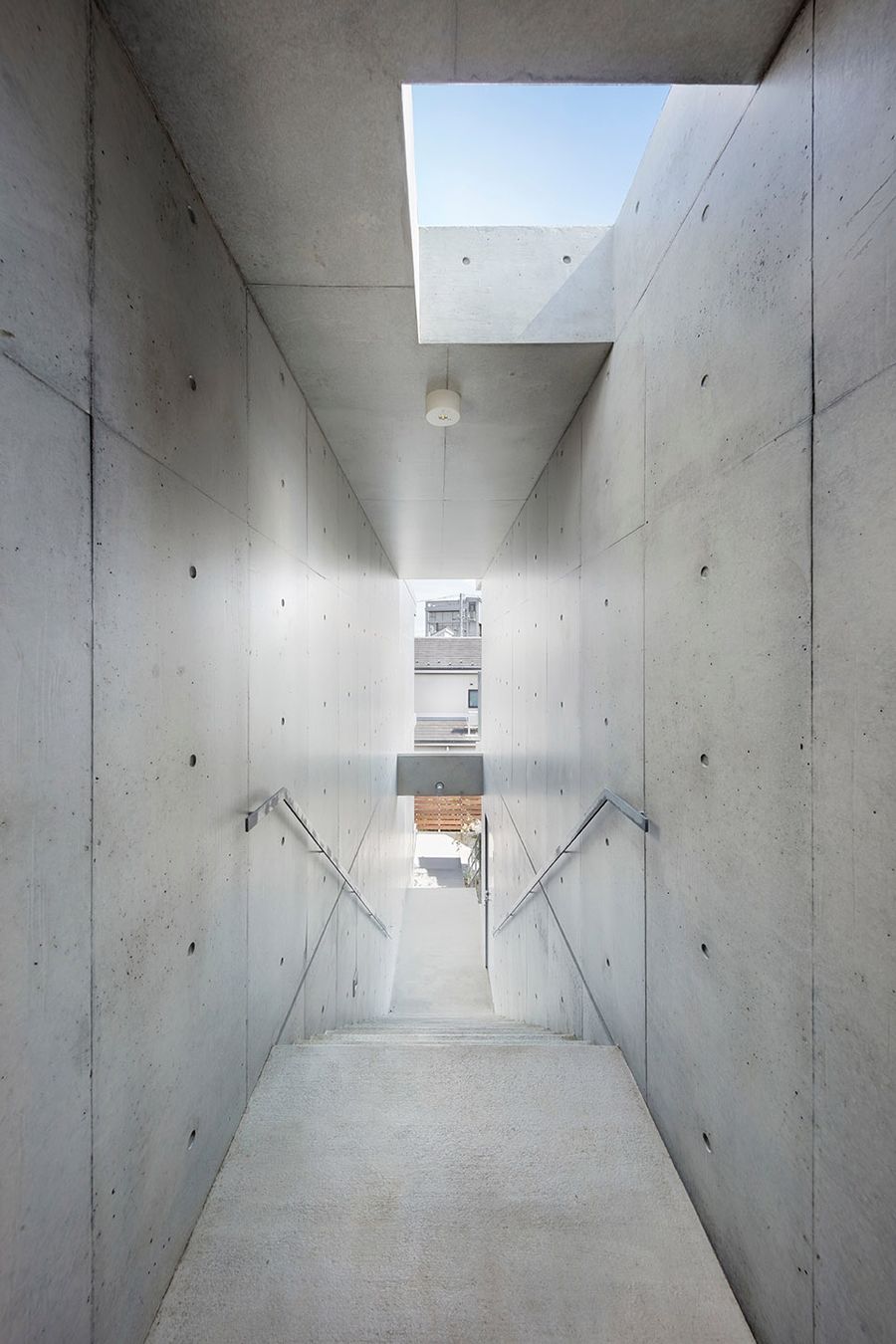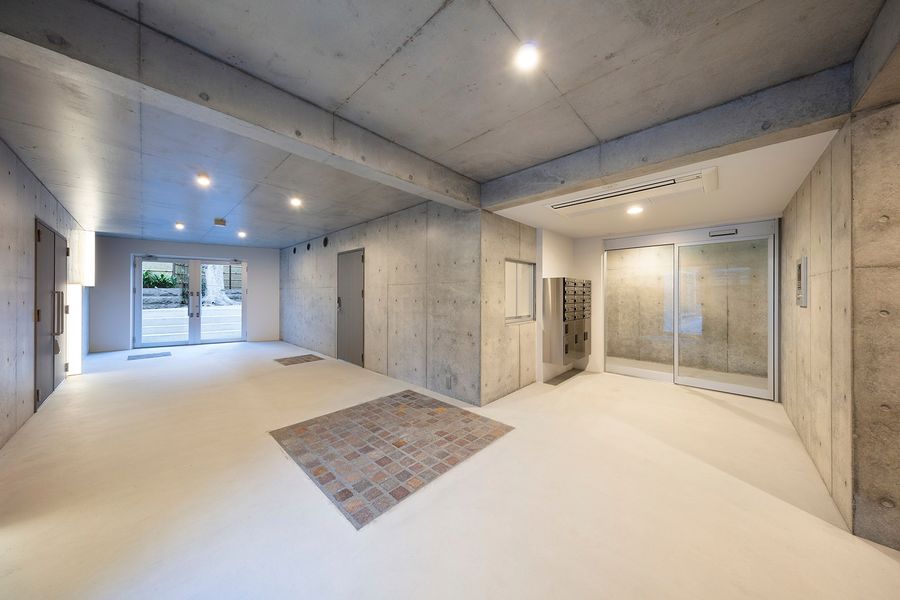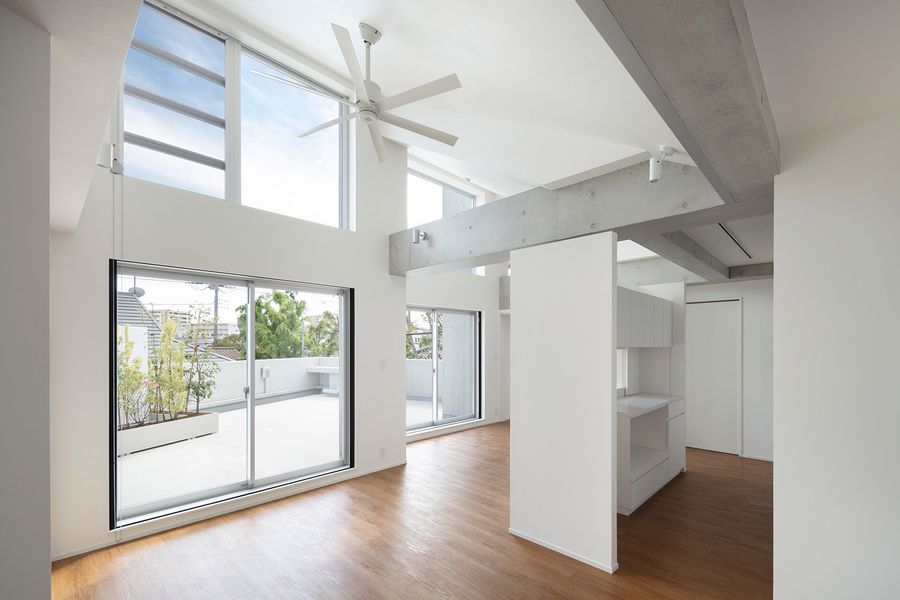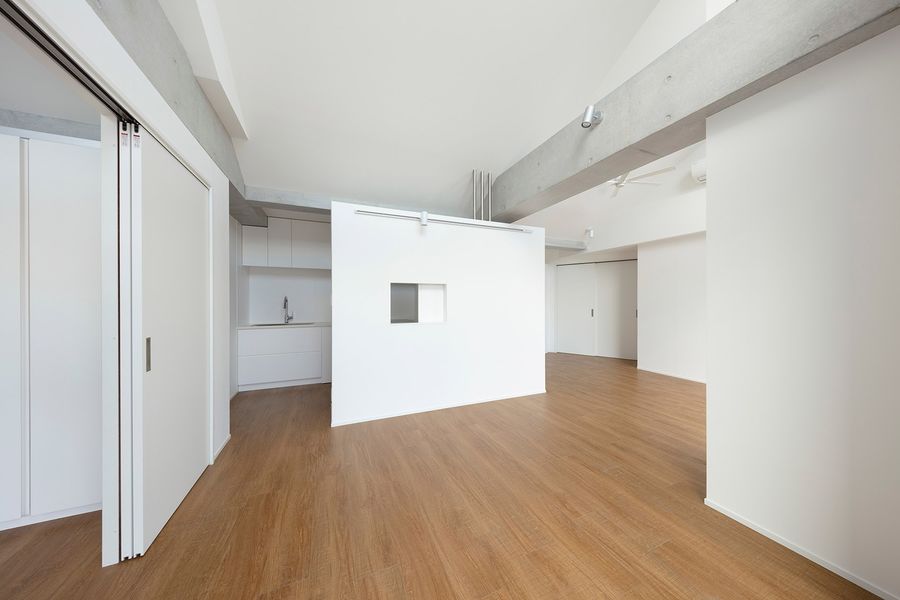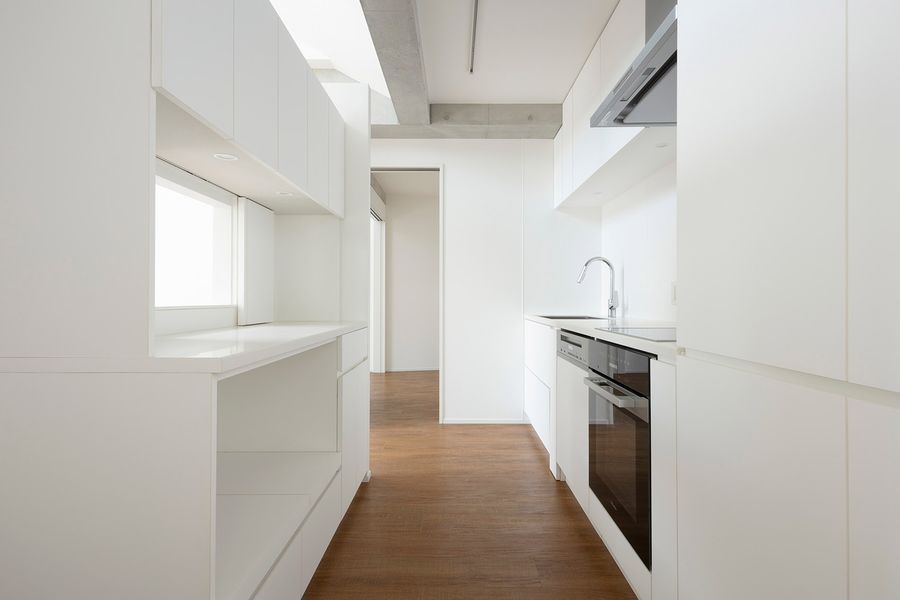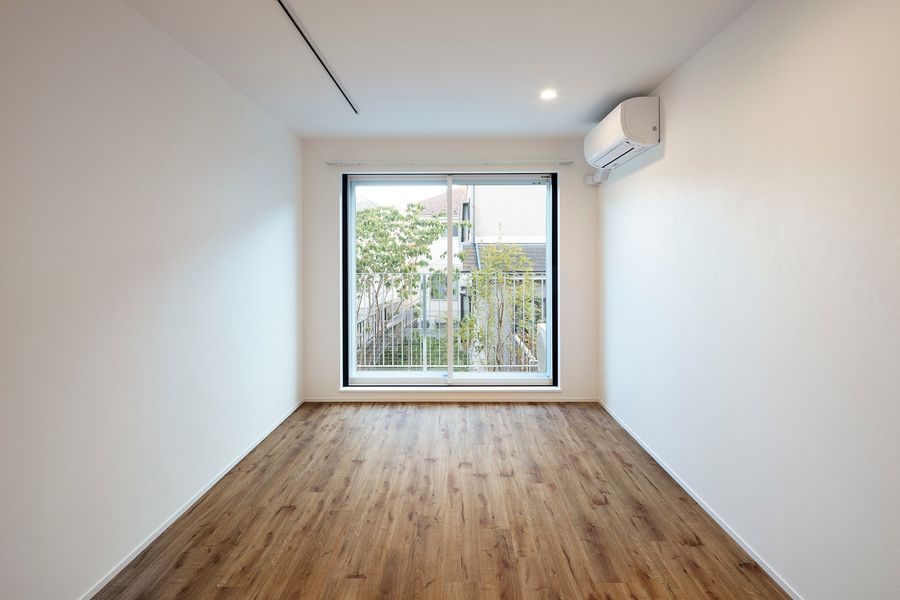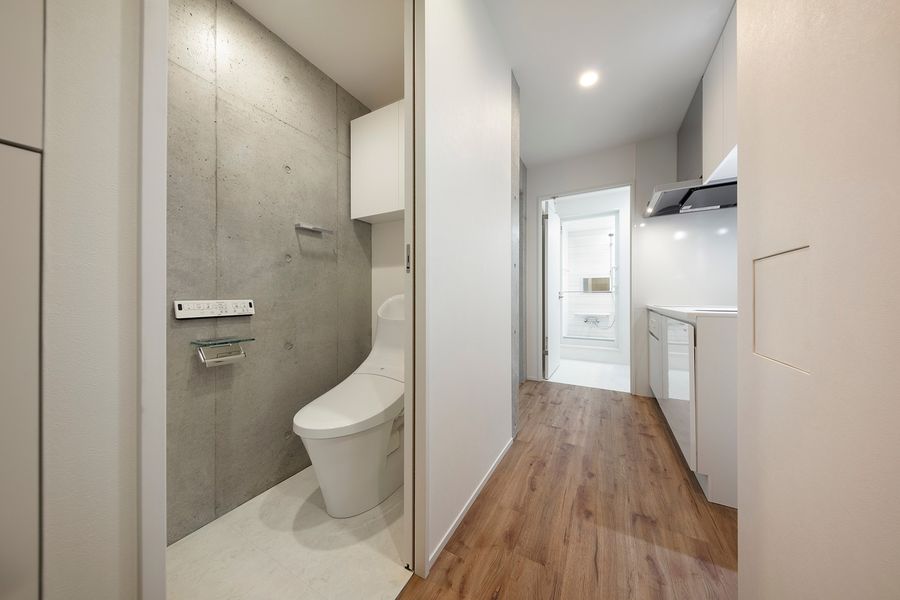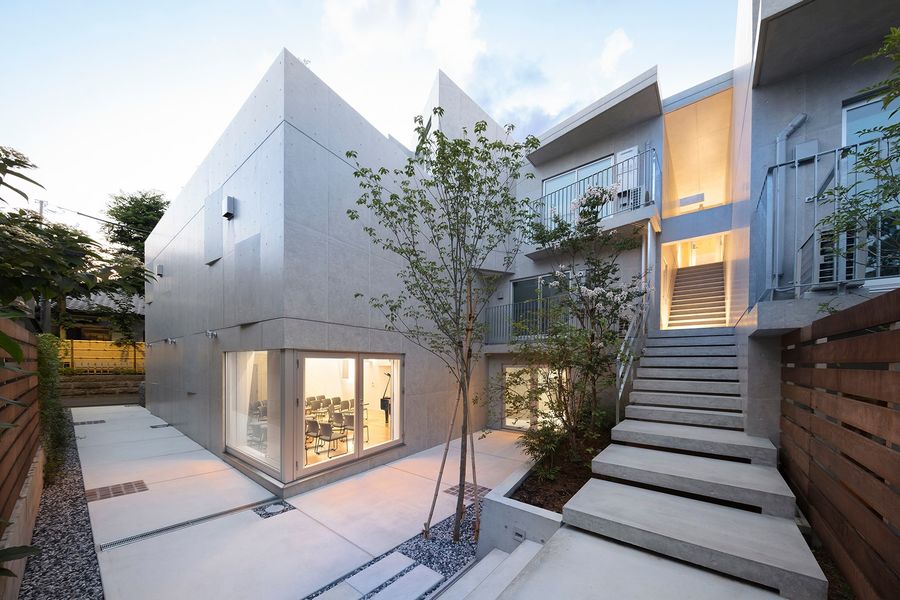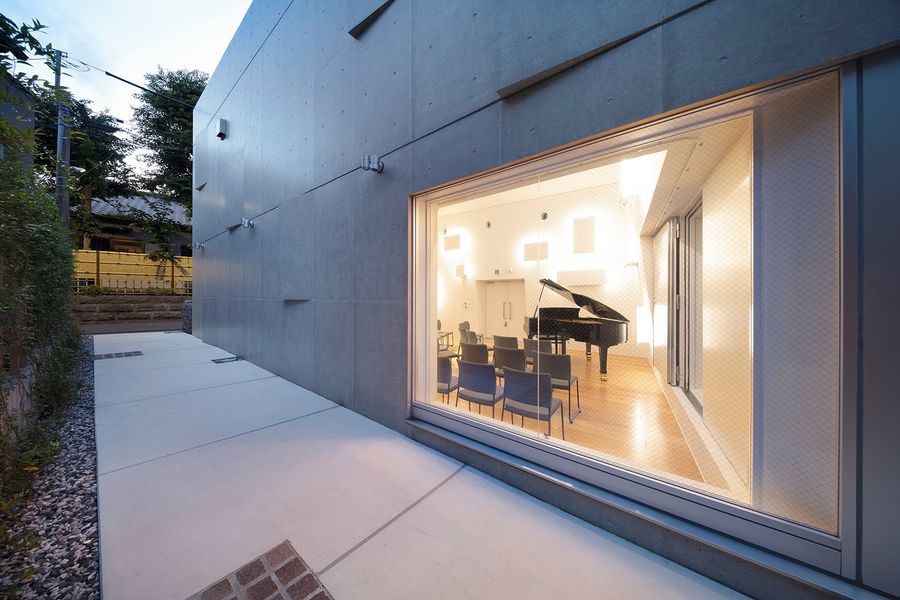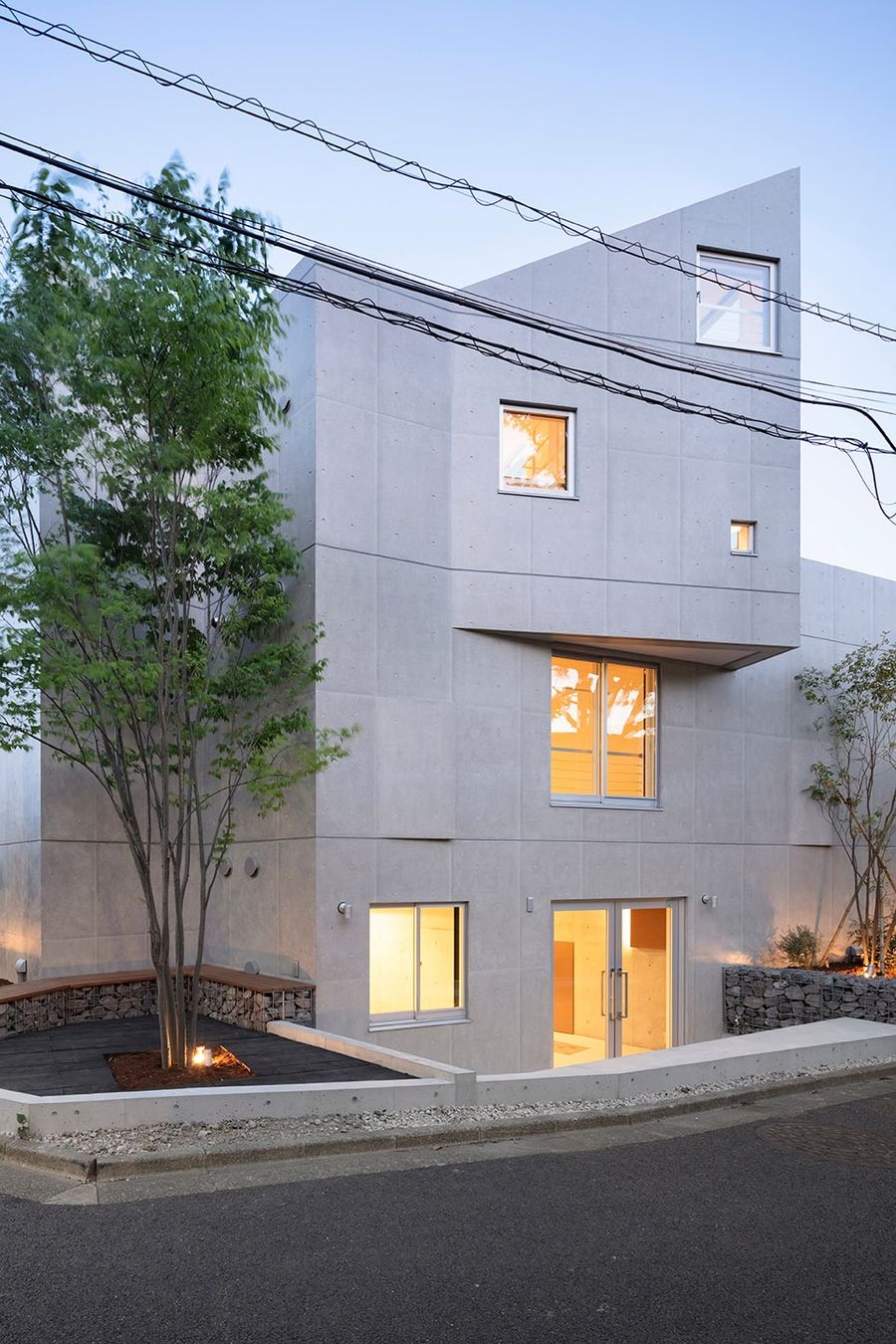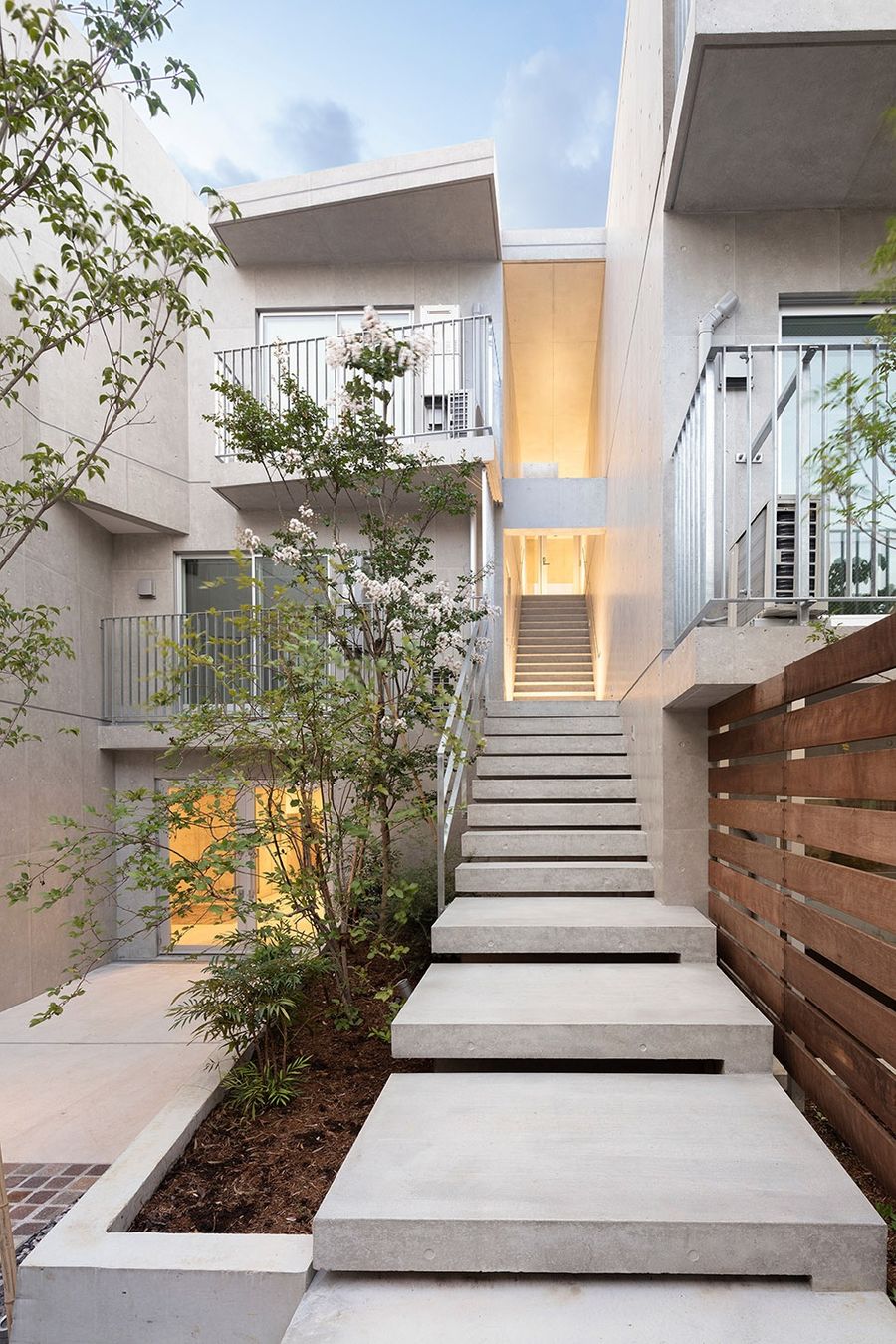本项目由屡获殊荣的国际知名建筑事务所Ryuichi Sasaki Architecture设计建造,该事务所专注于文化建筑的设计,极度关注建筑使用者的参观与使用体验。池上音乐中心的设计在建筑师与Takayuki Yagi和Yagi Komuten的合作下完成,并于2021年交付给业主Yasunori Kamata/K-M-T并投入使用,建筑主体采用了钢筋混凝土结构,内部容纳了音乐厅、练习室、隔音住宅租赁单元和顶层公寓。
Ryuichi Sasaki Architecture, an award-winning, internationally acclaimed architectural design firm specializing in cultural experiences, is proud to unveil the Ideareve-Ikegami. Completed in 2021 in collaboration with Takayuki Yagi and Yagi Komuten, for the client Yasunori Kamata / K-M-T, the reinforced concrete structure was designed to accommodate a music hall, practice rooms, soundproofed residential rental units, and a penthouse.
▼项目鸟瞰,aerial view of the project © Takumi Ota Photography
▼项目顶视图,top view of the project © Takumi Ota Photography
项目坐落于东京南部的池上地区,著名的池上本门寺山脚下。池上本门寺历史悠久,建于17世纪初,并以其巨大的五层宝塔而闻名,寺庙、咖啡馆、商店和住宅区共同组成了当地的文化中心。Ryuichi Sasaki Architecture此次的设计任务旨在为小镇创造一处灵活的公共设施,为当地居民提供社交聚会、表达自身创造力,并在多功能空间中学习与欣赏音乐的理想场所。最终,建筑的设计以惊人的几何美学回应了项目的需求。
▼轴测图,axonometric drawing © Ryuichi Sasaki Architecture
At the foot of the Ikegami Honmonji Buddhist temple, renowned for its massive five-story pagoda erected in the early 17th century, the Ideareve-Ikegami is located in the south Tokyo town of Ikegami, a cultural hub comprised of smaller temples, cafes, stores, and residential zones. The mandate for Ryuichi Sasaki Architecture was to design a facility for the town where residents can gather, express their creativity, and study music in a variety of hybrid spaces. The firm embraced the mandate and responded in a stunning geometrical fashion.
▼体量左侧为音乐厅与顶层公寓,右侧为住宅单元,the concert hall and the penthouse are on the left and the residential units on the right © Takumi Ota Photography
▼音乐厅与顶层公寓体量鸟瞰,aerial view of the concert hall and the penthouse © Takumi Ota Photography
▼顶部鸟瞰,aerial view of the roof © Ryuichi Sasaki Architecture
“池上本门寺是日连佛教最重要的精神场所,其辉煌的历史可以追溯到13世纪。我们面临的挑战是在其阴影下设计一个体验式的综合体,它将体现当地的社区精神和文化精髓,同时也将严格遵守建筑规范,以保护当地重要的文化遗产。”项目首席执行官兼首席建筑师Ryuichi Sasaki解释道。
“The Ikegami Honmonji temple is the most important spiritual site of the Nichiren Buddhist sect, with an illustrious history dating back to the 13th century,” explains Ryuichi Sasaki, CEO and Principal Architect. “The challenge for us was to design an experiential complex in its shadow that would embrace the spiritual and cultural essence of the community, while also respecting the types of strictly-enforced building codes that typically protect such heritage areas.”
▼音乐厅屋顶形成观景露台,the roof of the concert hall forms a viewing terrace © Ryuichi Sasaki Architecture
▼顶层公寓单元鸟瞰,aerial view of the penthouse © Takumi Ota Photography
与环境的无缝融合
A seamless blend with the environment
该综合体坐落于池上最大住宅区西北部的一块梯形场地上,场地西侧为当地寺庙与小镇的咖啡馆,咖啡馆的主要客人一般为前往寺庙的朝圣者。两层楼高能够容纳80个座位的音乐厅占据了建筑西南角的战略位置,可以通过前庭和门厅进入,进而形成了一个流通区域。这个区域起到了空间过渡的作用,模糊了室内外的界限,将周围令人心旷神怡的山丘景观与建筑内部充满活力的创意音乐氛围紧密地联系在一起。
▼音乐厅一侧街道视角,street view of the concert hall side© Takumi Ota Photography
▼街角花园,garden at the street corner © Ryuichi Sasaki Architecture
To the northwest of Ikegami’s largest cluster of residences, the complex sits on a trapezoidal site, just east of the town’s temples and cafes that cater largely to migrant waves of pilgrims en route to the temple. The two-story music hall and its 80-seat theatrical auditorium occupy a strategic place in the southwest corner of the structure, entered via a vestibule and foyer that combine to form a circulation zone that blurs the lines between the inspiring, undulating hills of the external landscape and the vibe of creativity that awaits inside.
▼场地入口,entrance of the site © Takumi Ota Photography
▼音乐厅体量街道视角,street view of the volume of the concert hall © Takumi Ota Photography
▼音乐厅体量,volume of the concert hall © Takumi Ota Photography
▼建筑线条彰显出惊人的几何美学,the lines of the building reveal a striking geometric aesthetic © Takumi Ota Photography
▼立面细部,exterior details © Takumi Ota Photography
门厅平面呈梯形,由三面黄铜色的不锈钢墙面围合。演出大厅内部墙面则铺设了高品质的隔音材质,沿对角线倾斜的墙体共同形成了抽象的梯形体量。音乐厅沿街一侧的立面由石笼墙点缀,勾勒出一系列种满植物的花园,大面积的玻璃开窗与多个入口则进一步加强了音乐厅与包括花园在内的周围景观之间的联系。
▼一二层透视分析图,perspective diagram © Ryuichi Sasaki Architecture
▼音乐厅门厅,foyer of the concert hall side © Takumi Ota Photography
▼音乐厅入口,entrance of the concert hall © Takumi Ota Photography
The foyer is embraced by three brass-colored, stainless steel diagonal walls, and the interior of the hall is encased in acoustic reflectors, with large walls that collectively form an abstract diagonal shape. Glass surfaces and multiple entranceways further embolden connections between the music hall and the surrounding landscape, with the latter embellished by gabion walls that delineate a garden of various species of plants.
▼音乐厅室内概览,interior view of the concert hall © Takumi Ota Photography
▼音乐厅灯光效果,light design of the concert hall © Takumi Ota Photography
▼演出配置,performance setting © Takumi Ota Photography
▼二层观众席视角,audience view on the second floor © Takumi Ota Photography
空间的重置与整合
Spatial reconfigurations
住宅区与音乐厅的共享入口位于建筑的中心位置,需要通过一系列台阶进入,楼梯上的建筑元素象征着攀登山坡朝拜池上本门寺的过程。在楼梯的顶部,一系列隔音出租公寓有序排列在走廊上,每套公寓功能都十分齐全,包括:厨房、浴室、隔音客厅和卧室。
Towards the center of the building, the residential zone shares its entranceway with the music hall, and is accessed via a staircase marked by architectural elements symbolically paying tribute to the climb to the Ikegami Honmonji temple. At the top of the staircase, a series of sound-proofed rental homes line the corridor, each comprised of a kitchen, bathroom, soundproofed living room, and sleeping quarters.
▼住宅单元一侧外立面,exterior view of the residential side © Takumi Ota Photography
▼住宅单元体量,volume of the residential unit © Takumi Ota Photography
▼入口台阶,entrance staircase © Takumi Ota Photography
▼底层花园,courtyard and gardens © Takumi Ota Photography
▼住宅单元一侧入口,entrance of the residential unit © Takumi Ota Photography
住宅体量还包含一个顶层公寓单元,该单元由三个建筑体块组成,公寓之中设有滑动隔墙,可以实现最大化的空间配置。通过移动滑动隔墙,客厅和餐厅区域可以得到扩展,以适应各种后勤情况。主卧室区也可通过滑动墙体,分隔出多间小卧室,以容纳其他家庭成员或住客。最后,在音乐厅上方,一处宽敞的大露台进一步模糊了建筑内外之间的边界,进而为来访者们提供了鼓舞人心的周围景观视野。
▼顶层公寓与住宅单元透视分析图,perspective plan of the penthouse and residential unit © Ryuichi Sasaki Architecture
The residential volume also houses a penthouse unit, comprised of three volume areas featuring sliding walls that enable maximum spatial configurations of its spaces. By reconfiguring the sliding walls, the living room and dining room areas can be enlarged to accommodate a variety of logistical situations. The sleeping quarters can also be reconfigured from a master bedroom into multiple bedrooms to accommodate other family members or houseguests. Finally, above the music hall, a large terrace further fuses the seamless border between the building’s interior and exterior, incorporating inspirational views of the majestic landscape for the benefit Ideareve-Ikegami patrons.
▼顶层公寓单元,penthouse unit© Takumi Ota Photography
▼立面细部,exterior detail of the penthouse © Takumi Ota Photography
▼楼梯,staircase © Takumi Ota Photography
“住宅区与音乐厅之间过渡区的优美景观旨在激发人们音乐创造力,使人们的情感与旋律和节奏之间产生共鸣。“该项目有助于当地的文化融合,以热情好客的姿态向来访者们展示出小镇的音乐特色,我们很自豪能够为池上居民建造出这样一座综合体。”建筑师Ryuichi Sasaki总结道。
“Views from the residential area, as well as the music hall circulation areas, were designed to inspire emotions conducive to musical creativity and melodic rhythms,” concludes Ryuichi Sasaki. “The project contributes to the blending of culture and hospitality that characterizes the town, and we are proud to provide this complex for the joyful use of residents of Ikegami.”
▼住宅单元一侧门厅,foyer of the residential side © Takumi Ota Photography
▼顶层公寓室内概览,interior view of the penthouse © Takumi Ota Photography
▼隔音起居室与厨房,soundproof living room and kitchen © Takumi Ota Photography
▼卧室/练功房,bedroom/practice room © Takumi Ota Photography
▼卧室/练功房,bedroom/practice room © Takumi Ota Photography
▼庭院夜景,night view © Takumi Ota Photography
▼底层平面图,ground floor plan © Ryuichi Sasaki Architecture
▼二层平面图,second floor plan © Ryuichi Sasaki Architecture
▼三层平面图,third floor plan © Ryuichi Sasaki Architecture
▼四层平面图,fourth floor plan © Ryuichi Sasaki Architecture
▼立面图,elevations © Ryuichi Sasaki Architecture
▼剖面图,section © Ryuichi Sasaki Architecture
▼剖面图分析图,section diagrams © Ryuichi Sasaki Architecture
▼场地分析图,analysis diagram© Ryuichi Sasaki Architecture
▼细部详图,construction details © Ryuichi Sasaki Architecture
Credits and Technical details
Lead Architect: Ryuichi Sasaki /RYUICHI SASAKI ARCHITECTURE
Collaboration Architect (Producer): Takayuki Yagi / Yagi Komuten
Client: Yasunori Kamata / K-M-T
Design Team: Ryuichi Sasaki, Gen Sakaguchi, Yuriko Ogura /RYUICHI SASAKI ARCHITECTURE
Structure Engineer: Tatsumi Terado /Tatsumi Terado Structural Studio
Acoustics: Akira Ono/ Nagata Acoustics
Landscape: Takeshi Matsuo /Plat Design
Light Design: Natsuha Kameoka /Lighting Sou
Metal: Tatsunori Horiyama/Shinko Stainless Polishing
Photography: Takumi Ota Photography
Project Name: IDEAREVE IKEGAMI
Building Purpose: Music Hall, Music Practice Room, Soundproofed Residential Housing, Owners housing
Location: 1-30-23 Ikegami, Ota-ku, Tokyo, Japan
Site Area: 614.14 m2
Building Area: 305.35 m2
Total floor Area: 794.44 m2
Structure: Reinforced Concrete
Completion Date: June 2021


